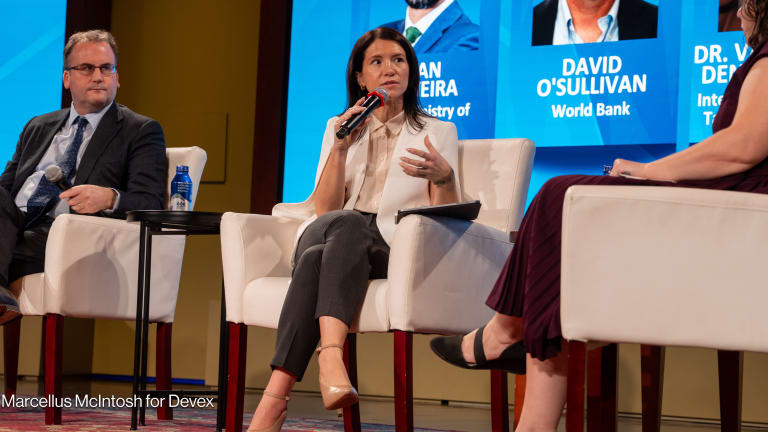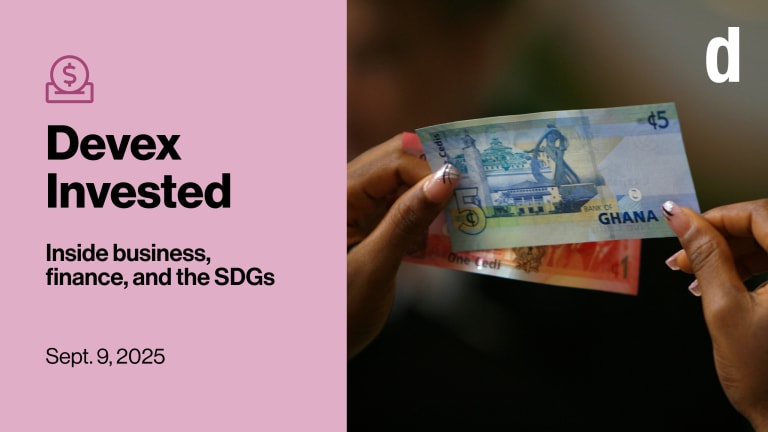
This is a preview of Devex Invested
Sign up to this weekly newsletter inside business, finance, and the SDGs, in your inbox every Tuesday.
For years, countries have cut tax rates in an effort to attract large multinationals, sacrificing tax revenue for the benefits that come with more foreign direct investment. Some experts say this global race to the bottom is harmful to low-income countries in particular.
Can what some call a landmark agreement from the G-7 group of nations on a 15% minimum global corporate tax rate really make a difference?
• “Many developing countries are very attracted and addicted to giving tax holidays to big companies,” Ben Dickinson, from the Organisation for Economic Co-operation and Development’s Centre for Tax Policy and Administration, tells Devex. “And it’s a huge problem because it’s effectively giving away their tax base,” he says, though they often don’t receive the anticipated investment.
• Still, in reality, many low-income countries have corporate tax rates well above the G-7 threshold. The average across the African continent is 27.46% this year, according to KPMG.
• Some hailed the G-7 agreement, but plenty of others have criticized it as doing too little — or, as Oxfam International Executive Director Gabriela Bucher puts it, “setting the bar so low that companies can just step over it.” She has also called the deal unfair, saying it would benefit rich countries and increase inequality in part because multinationals will pay tax where they are headquartered rather than where their profits are made.
The discussion is set to continue in the coming months through the OECD/G20 Inclusive Framework on Base Erosion and Profit Shifting — an effort that includes nearly 140 countries and jurisdictions.
Among the issues I’ll be watching are digital taxation and whether countries can agree to require companies — especially digital ones — to pay tax where they earn profits. Experts tell me a global digital taxation agreement could have a greater benefit for low-income countries than a global corporate tax.
What do you make of the corporate tax rate proposal? What would you like to see in the discussions ahead? Please get in touch with any feedback or news tips: adva.saldinger@devex.com.
Show me the impact
“Society is increasingly asking for more transparent reporting on how development resources are used and the development impacts they generate. Transparent reporting is a major missing piece of the puzzle.”
OECD’s Development Assistance Committee approved the OECD-UNDP Impact Standards for Financing Sustainable Development in March. It’s a watershed moment for the committee and an indication “of the seismic changes taking place in the world of sustainable finance,” Ronald Cohen and Jorge Moreira da Silva write for Devex.
Stakeholder vs. shareholder showdown
Back in August 2019, Business Roundtable, an association of American CEOs, revised its definition of the purpose of a corporation. Many heralded this as a key moment in moving away from a purely shareholder-driven version of capitalism to one that serves all stakeholders, including communities and employees.
I’ve been thinking about it this week since I saw some of Walmart’s shareholders proposed that the company leave Business Roundtable — objecting to the company moving away from shareholder primacy — even though Walmart CEO Doug McMillon is the group’s chairman. Walmart’s board recommended against the proposal, saying the company had worked to “maximize long-term value for our shareholders by serving our stakeholders” even before 2019.
While there has certainly been growing rhetoric around companies committing to changing the way they operate, from what I hear and see, there is a mixed record in whether companies are actually taking a longer-term view. How exactly these changes might impact the achievement of the Sustainable Development Goals seems to be a work in progress.
Let the sunshine in
Last week, a trio of environmental groups sued the U.S. International Development Finance Corp., challenging a decision the institution made last year to exempt itself from the Government in the Sunshine Act, which requires government agencies to hold public meetings.
Investments of interest
• DFC announced it will give the Near East Foundation UK $10 million to improve refugee livelihoods through a development impact bond that aims to mobilize private sector investment. This will be the first DIB that specifically targets refugees.
• The Netherlands Development Finance Company, better known as FMO, committed $20 million to SUSI Partners’ Asia Energy Transition Fund as part of its first close, according to a press release from the bank. The fund, which will provide equity and quasi-equity investments, is one of the first in the region to fund the energy transition space.
+ A new special report for Pro subscribers is launching in seven days. Register your interest to learn how global development organizations are using social media for outreach and fundraising.

Search for articles
Most Read
- 1
- 2
- 3
- 4
- 5








